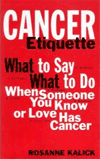Cancer Etiquette: What to Say, What to Do When Someone You Know or Love Has Cancer
Author: Rosanne Kalick OncoLinkRating: |
In my years as a nurse, I often think I have heard it all from visitors, and then someone tops it. "You must have done something to deserve this" or "Honey, don't kiss Grandma, you might catch something" may be some of the worst. It seems that when people hear the word "cancer", they sometimes lose all basic etiquette (or is it common sense?). In some cases, it may be true ignorance to the facts, but the patient is hardly in the mood to educate others. When I saw this book, I thought, finally some help!
As a two-time cancer survivor, Rosanne Kalick has heard far too many comments that failed in their delivery. As friends, family, and co-workers, we are bystanders on the cancer journey. We are often at a loss for words, but too often, we use words that do more harm than good. People don't always realize the effect their words can have on a person dealing with a cancer diagnosis. The comments are often well-meaning, just not always well thought-through.
Roseanne tells of a 12-year-old boy who was having his picture taken with tennis star, Andre Agassi. A person looking on commented, "It almost makes it worth having leukemia, doesn't it?" While this observer probably meant no harm, I am sure the boy would have traded that photo for his health any day. For others, the fear of their own mortality, or a fear of "saying the wrong thing", can lead to silence or avoidance, thus straining or ending precious relationships. Patients often tell me they learn who their real friends are because they are the ones who don't crawl into the woodwork. For many of us, it isn't so simple, but Rosanne is trying to change that. She has written this guide for anyone who knows someone with cancer, or any other major illness for that matter.
I found the first two chapters to be a bit scattered, not really getting to the meat of the "advice", but describing the problem at hand. The author then got down to business. She includes stories experienced by her and others, where words and actions succeeded or failed. Through these stories, she helps the reader understand what he or she can do to provide much needed support to someone with cancer. She covers issues like appropriate gifts, staying connected, the use of humor, and caring for survivors and caregivers. This "guide" is a great read for anyone who knows someone with cancer (including health care providers!).


